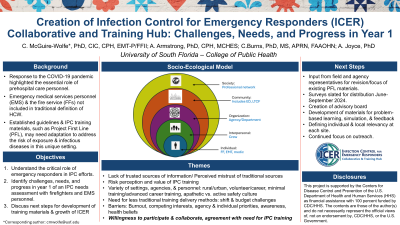Leadership Development and Program Management
Category: Leadership Development and Program Management
Poster Theater Session V
LDPM 104 - Creation of an Infection Control for Emergency Responders (ICER) Collaborative and Training Hub: Challenges, Needs, and Progress in Year 1
Tuesday, June 4, 2024
12:20 PM - 12:25 PM CST
Location: Digital Poster Theater - APIC Central, Hall 1

Has Audio
.jpg)
Christine M. McGuire-Wolfe, PhD, CIC, CPH (she/her/hers)
Assistant Professor
University of South Florida
Presenter(s)
Disclosure(s):
Christine M. McGuire-Wolf, PhD, CIC, CPH: No financial relationships to disclose
Background: Response to the COVID-19 pandemic highlighted the essential role of prehospital care personnel. Emergency medical services personnel (EMS) and the fire service (FFs) have not been included in the traditional definition of healthcare workers. Established guidelines and existing infection prevention and control (IPC) training material, such as the Centers for Disease Control’s (CDC) Project First Line (PFL), may need adaptation to address the risk of exposure and infectious diseases in this unique setting.
Methods: The CDC has granted funding to establish the Infection Control for Emergency Responders (ICER) Collaborative and Training Hub. A multi-disciplinary team has been tasked to complete a needs assessment with EMS personnel and FFs to inform efforts to develop a multi-modal IPC training approach for the prehospital setting.
Results: Interviews and focus groups have been conducted with field personnel and agency representatives to determine existing IPC resources, training needs, perception of existing training materials, willingness to engage, and sources of IPC information. Comprehensive literature reviews have been conducted regrading 1) ambulance contamination; 2) existing IPC training and overall training methods for FFs and EMS personnel; and 3) factors influencing determination of trusted sources of health information. Identified themes include: lack of existing resources; a need for pre-established relationships between agencies that will engage in pandemic response; willingness to participate in ICER efforts to develop training materials and guidelines; and an opportunity for ICER to serve as a hub for IPC materials, policy review, and networking.
Conclusions: ICER’s next steps in development of IPC training materials and program development are determined by input for field and agency representatives and include revision or clarification of existing PFL materials; creation of an advisory board; development of additional materials for problem based learning, simulation, and feedback; and defining personal and local relevancy at each site and agency.
Learning Objectives:
- Understand the critical role of emergency responders in Infection Prevention and Control efforts.
- Identify challenges, needs, and progress in year 1 of an Infection Prevention and Control needs assessment with firefighters and emergency medical services personnel.
- Discuss next steps for development of training materials and growth of the Infection Control for Emergency Responders Collaborative and Training Hub.

